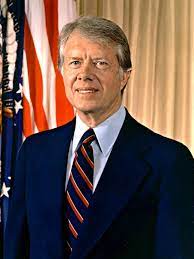Jimmy Carter: An Era of Diplomatic Triumphs and Domestic Challenges
Former U.S. President Jimmy Carter, who passed away at age 100, left a significant mark on international diplomacy with achievements like the Camp David Accords and U.S.-China relations. However, his presidency also faced domestic hurdles such as the Iran Hostage Crisis, an energy crisis, and economic malaise.

Former U.S. President Jimmy Carter passed away at the age of 100. Carter, who served as President from 1977 to 1981, had a presidency marked by significant diplomatic achievements and challenging domestic issues.
One of Carter's notable accomplishments was the Camp David Accords, which he brokered in 1978 between Israeli Prime Minister Menachem Begin and Egyptian President Anwar Sadat. This series of agreements led to a historic peace treaty between Israel and Egypt. Begin and Sadat received the Nobel Peace Prize for their efforts, with Carter also recognized with the Nobel Peace Prize in 2002 for his ongoing dedication to peaceful conflict resolution.
Internationally, Carter played a vital role in normalizing U.S.-China relations, formally recognized in 1979 after complex negotiations. Domestically, his tenure was plagued by issues such as the 1979 Iran Hostage Crisis, energy crises leading to fuel shortages, and economic difficulties characterized by high inflation and recession concerns, which hindered his re-election campaign in 1980.
(With inputs from agencies.)










